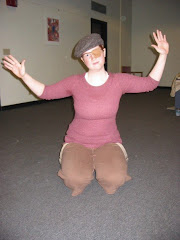I've been back in Oberlin for about two weeks now, working at the admissions office. I've met some pretty neat prospective students. Whoever thought "fearless" would totally change the demographic of students applying to Oberlin was off their nut.
The National Council of Churches Faith and Order Conference in Oberlin went down last week. I was fully expecting to be reminded just how much of a
low church/congregational polity fan I am, but I was not expecting the
number of people on panels reading papers full of high churchy and academic jargon. In short, it was a lot of creed and a lot of tweed. It concerned me how disconnected the
papers were from the practical realities of living ecumenically. A lot
of the discussion centered on theories of ecumenism, which I often found
somewhat behind my own experience of relating to people of both
different denominations and different faiths. It made it difficult for
me to wrap my mind around questions like, for example, does pursuing
interfaith dialogue interfere with Faith and Order's ability to work for
"visible Christian unity?" Since to some degree both tasks are simply
unavoidable parts of my everyday life experience, I don't understand how
they could be at odds. I also found I was much more comfortable with the idea of there being no overarching Truth that applies to everyone than many of the older (50+) members of
the conference.
I also felt like the ecumenical and interfaith dialogue that I am
currently defining myself within was rarely present in the dialogues
they were talking about. I'm defining myself within the crossroads of
racial, faith, and sexual identity. My denominational identity, if
anything, is subordinate to these.
I was actually surprised how many white men were presenting. Out of
about twenty-five presenters, there were only three women and perhaps
five people who weren't white. There would have been four, but
Jacquelyn Grant couldn't make it at the last minute. I was more than a
little disappointed, since I was looking forward to her presentation
more than anyone else's.
We were told in orientation that we were not there to represent
ourselves, but our denominations. Luckily, I avoided the complex
ethical question that presents because my denomination has no beliefs of
its own. Later on, though, a National Baptist minister in my discussion
group pointed out how we were being asked to separate our denominational
identities from our personal identities. As an African-American woman,
she could not separate the history of her people from her theology, and
her cultural identity and religious identity were similarly inseparable.
I had a delightful conversation with an Australian scholar named Jione
Havea. He gave a presentation about viewing the Bible as storytelling,
a la Kwok Pui-lan and Musa Dube. He affirmed my suspicion that a Watson
Fellowship might not best suit my goals for going abroad.
I learned that the proper term for denominations that don't play well
with others, like Assembly of God, Southern Baptist Convention, and
Lutheran Church Missouri Synod, is "ecumenically cautious." I also
learned that Hebrew is easier to learn than Greek because Hebrew
translates directly into ebonics: "God be in this place."
Subscribe to:
Post Comments (Atom)




1 comment:
"Ecumenically cautious." Nice euphemism.
Kinda like saying the Germans or Rwandans were "ethnically tidy."
-bethany's dad
Post a Comment